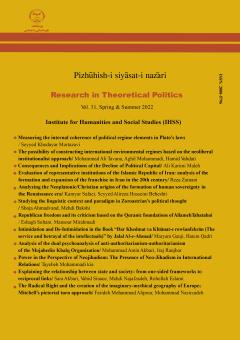Explaining the relationship between state and society: from one-sided frameworks to reciprocal links
Subject Areas : Research in Theoritical Politics
sara akbari
1
,
Vahid sinaee
2
![]() ,
Mehdi Najafzadeh
3
,
Mehdi Najafzadeh
3
![]() ,
eslami eslami
4
,
eslami eslami
4
![]()
1 - PhD student in Political Science (Iranian studies), Ferdowsi University of Mashhad. Iran.
2 - Associate Professor, Department of Political Science, Ferdowsi University of Mashhad, Iran.
3 - Associate Professor, Department of Political Science, Ferdowsi University of Mashhad, Iran.
4 - Assistant Professor, Department of Political Science, Ferdowsi University of Mashhad, Iran.
Keywords: state, society, power, state-society relationship, historical institutionalism,
Abstract :
Explaining the relationship between the state and society is one of the most important theoretical challenges in political science. In a theoretical conflict and as a result of numerous criticisms of one-dimensional explanations of society or the state, the key question is to what extent univariate and one-sided theories have the power to explain and answer why and how the relationship between state and society is and what are their shortcomings. This article first seeks to critique the analytical tradition in the literature on government-society relations and then explain the components of historical institutionalism as one of the approaches in political science. According to this view, the government and society have mutually influenced each other in their historical process. This view sees the power of the state and the manifestation of this power in connection with the power of the society and considers the existing institutional arrangements in society and their transformation as the product of the connection of power structures in a historical process. The main components of this theory are “important milestones, path dependence, timing and sequence, events, design, and institutional transformation”.¬ The analytical framework presented in this paper is based on systematic attention to how institutional arrangements are established and consolidated in the context of time, and therefore rather than having the characteristics of specific theories, it is introduced as a general theoretical framework. It may have more power to analyze the role of institutions in the social sciences in general and political science in particular.
اندرسون، پری (1390) تبارهای دولت استبدادی، ترجمه حسن مرتضوی، تهران، ثالث.
بدیع، برتران و پیر بیرن بوم (1379) جامعه¬شناسی دولت، ترجمه احمد نقیب¬زاده، تهران، باز.
بشیریه، حسین (1374) جامعه¬شناسی سیاسی (نقش نیروهای اجتماعی در زندگی سیاسی)، تهران، نشرنی.
----------- (1378) جامعه مدني و توسعه سياسي در ايران: گفتارهايي در جامعهشناسي سياسي، تهران، مؤسسه نشر علم نوین.
پیترز، گای (1386) نظریه نهادگرایی در علم سیاست، ترجمه فرشاد مؤمنی و فریبا مؤمنی، تهران، جهاد دانشگاهی.
پیرسون، پل (1393) سیاست در بستر زمان، ترجمه محمد فاضلی، تهران، نشرنی.
ویلبر، چارلز کی و رابرت هاریسون (1385) «بنیان روششناختی اقتصاد نهادی: الگو، داستان-سرایی و کل¬گرایی»، ترجمه عباس رحیمی، فصلنامه اقتصاد سیاسی تحول همهجانبه، سال اول، شماره سوم، صص 64-91.
Carey, John M. (2000) Parchment, Equilibria, and Institutions, Comparative Political Studies, Vol.33, 6-7, pp.735-61.
Clemens, Elisabeth S, and James M Cook (1999) Politics and Institutionalism: Explaining Durability and Change, Annual Review of Sociology, Vol. 25, pp. 441-466.
Collier, Ruth Berins. and Collier, David (1991) Shaping the Political Arena, Princeton, NJ: Princeton University Press.
David, Paul .A , (2000) Path Dependence, its Critics, and the Quest for ‘Historical Economics, in The Evolution of Economic Institutions.
Dodd, Lawrence C. and Calvin C. Jillson (1994) Dynamics of American Politics: Approaches and Interpretations, Westview Press.
Evans Peter (1995) Embedded autonomy: States and industrial transformation, Princeton: N.J: Princeton University Press.
Hacker, Jecob (2002) The Divided Welfar State: The Battle over Public and Private Social Benefit in the United State. Cambridge: Cambridge University Press.
Huntington, Samuel P.¬ (1968) Political Order in Changing Societies, New Haven and London, Yale University Press.
Jessop, Bob (2007) State Power: A Strategic-Relational Approach, Polity, Cambridge.
Levi, Margaret (1997) A Model, a Method, and a Map: Rational Choice in Comparative and Historical Analysis. In: Lichbach, M. and Zuckerman, A. Eds. Comparative Politics: Rationality, Culture and Structure, Cambridge University Press, Cambridge, 19-41.
Mahoney, Jamez (2000) “Path Dependence in Historical Sociology”, Theory and Society, 29 (4): 507-548.
Marx, karl (1963) The Eighteenth Bromaire of Louis Bonapart, New York.
Marx, Karl & Engels, Friedrich (1848) Manifest der Kommunistischen Partei. (The Manifesto of the Communist Party), Many editions. https: //www.marxists.org.
------------------------------------ (1968) selected works in one volume, NEW York, International publishrs.
Miller, Gary (2000) Rational Choice and Dysfunctional Institutions, Governace, 13, 4, pp.535-47.
Nordlinger, Eric (1981) On the Autonomy of the Democratic State Cambridge, Mass: Harvard University Press.
Pierson, Paul and Skocpol, Theda (2002) “Historical Institutionalism in Contemporary Political Science”, In: Henry Milner / Ira Katznelson (eds.) Political Science: The State of the Discipline, New York: W.W. Norton, 693-721.
Sewell, William H (1996) Three temporalities: Toward an eventful sociology, in The historic turn in the human sciences, vol 89, pp 245-280.
Steinmo, Sevn (2008) “Historical Institutionalism? In Donatella Della Porta and Michael Keating (eds.) Approaches and Methodologies in the Social Sciences. A Pluralist Perspective, Cambridge: Cambridge University Press.
Steinmo, Sevn & Longstreth, Frank (1992) Structuring Politics: Historical Institutionalism in Comparative Analysis, Cambridge: Cambridge University Press.
Thelen, Kathleen (2008) “How Institutions Evolve: Insights from Comparative Historical Analysis”, In J. Mahoney & D. Rueschemeyer (Eds.) Comparative Historical Analysis in the Social Sciences, Cambridge: Cambridge University.
Thelen, Kathleen & Steinmo, Sevn (2002) “Historical institutionalism in comparative politics”, In Sven Steinmo; Kathleen Thelen, & Frank Longstreth (Eds.), Structuring politics: Historical institutionalism in comparative analysis, Cambridge: Cambridge University Press: 1-32.
Thelen, Kathleen & Steinmo, Sevn & Longstreth, Frank (1992) Structuring Politics: Historical Institutionalism in Comparative Analysis, Cambridge: Cambridge University Press.
Tilly, Charles (2000) Processes and Mechanisms of Democratization Sociological Theory, Vol. 18, No. 1, pp 1–16.
Weber, Max (1971) Economy and Society. An Outline of Interpretive Sociology. Edited By Guenther Roth and Claus Wittich. 3 Vols. New York: Bedminister Press.


